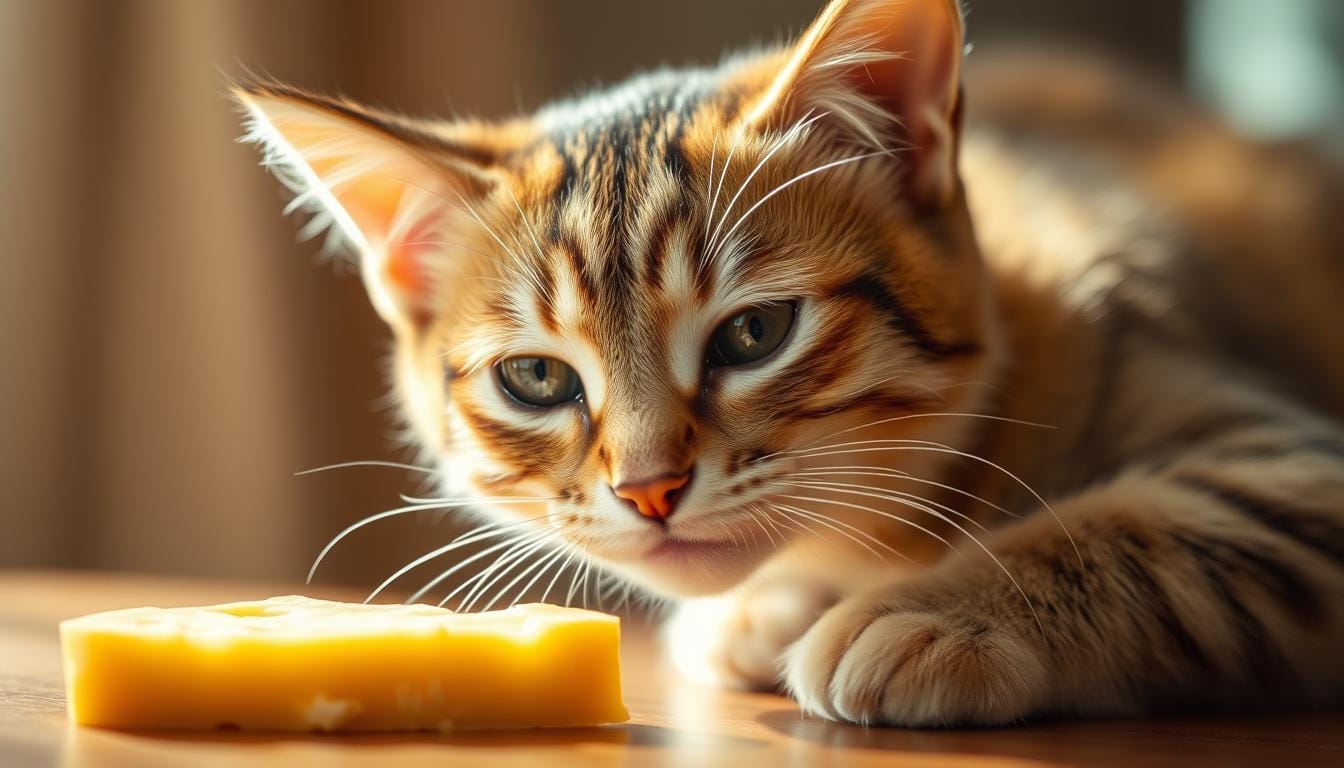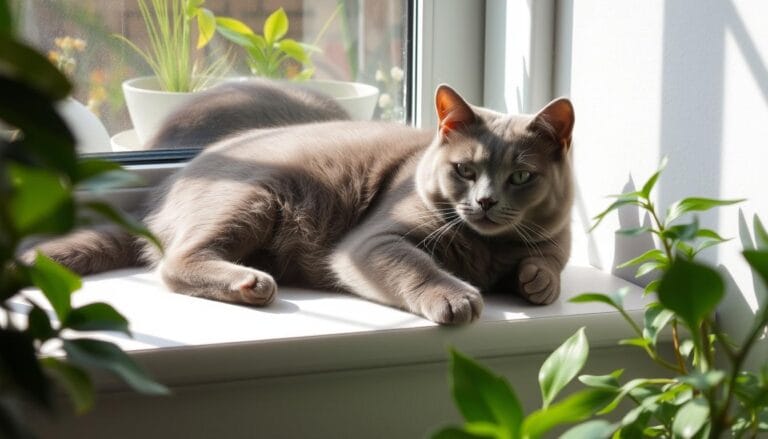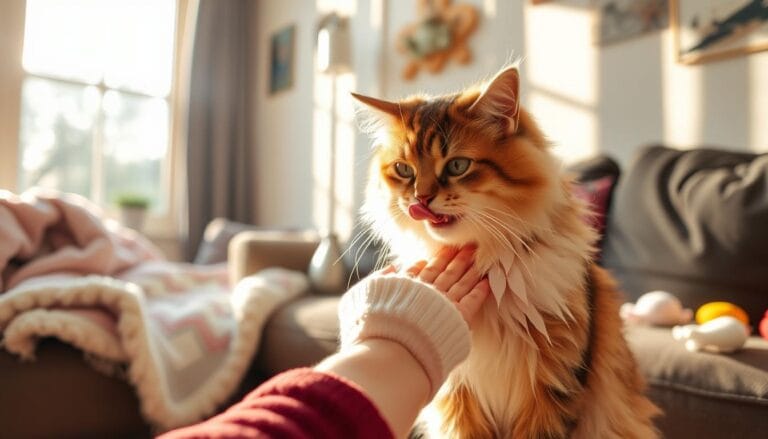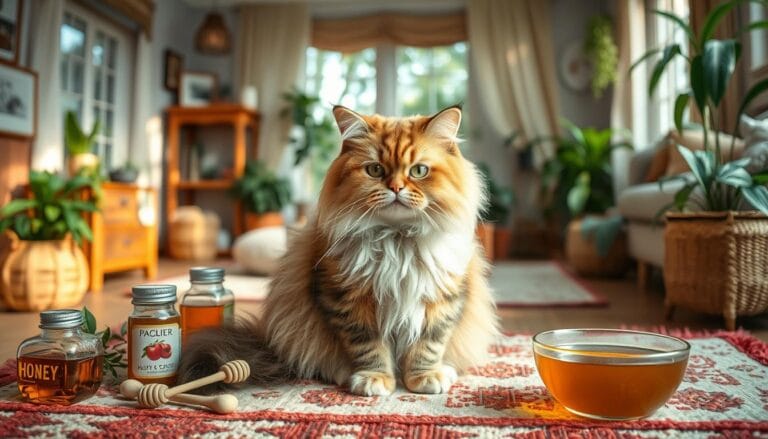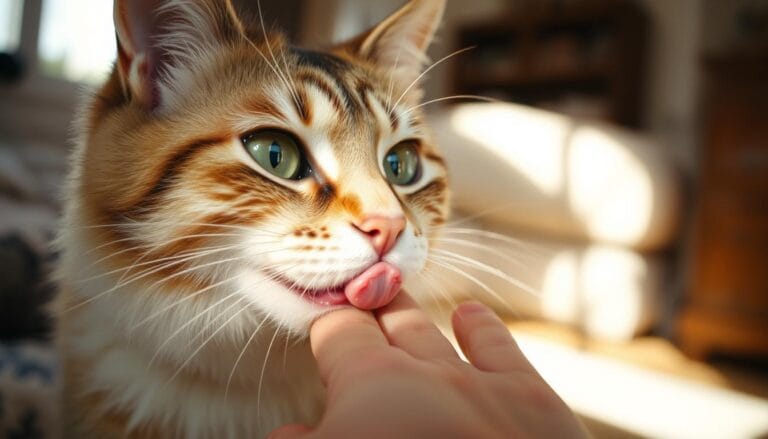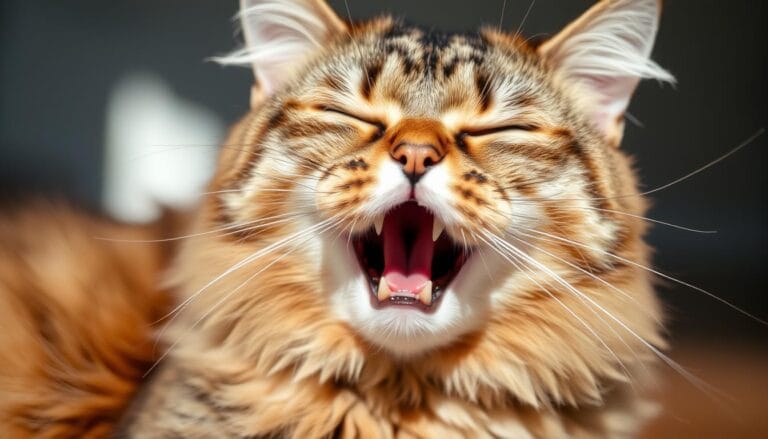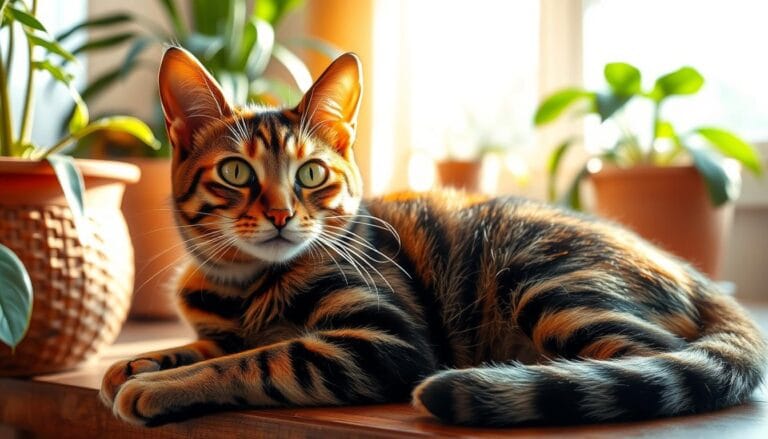Can Cats Eat Cheese? Healthy Snack or Dangerous Habit?
Have you ever seen your cat eyeing a slice of cheese? It’s tempting to give them a little bit. But, it’s key to know the truth about cats and cheese. Cheese can be a low-carb treat, but it comes with risks. As a pet parent, knowing when and how to give cheese is vital for your cat’s health and happiness.
Cats are meant to eat meat, not dairy like humans. Some cheeses, like hard, aged ones, might be safer in small amounts. But, other cheeses can upset their stomachs. Cheese is also high in fat and sodium, which can harm cats, even more so for those who are overweight or obese. It’s a delicate balance between pleasing your cat and keeping them healthy.
Table of Contents
So, can cats eat cheese safely? The answer is not simple. Cheese can be a fun treat now and then, but it’s not essential for their diet. Knowing the risks and benefits is important for making the best choice for your cat. Let’s explore more to see if cheese is a good choice for your feline friend.
Key Takeaways
- Cheese can be a low-carb treat for cats but should not exceed 5% of their daily caloric intake.
- Hard, aged cheeses like cheddar and parmesan are safer options compared to softer cheeses.
- Cats are often lactose intolerant, which can lead to digestive issues like vomiting and diarrhea.
- Feeding cheese should be occasional and in very small amounts, about the size of a die.
- Most veterinarians recommend avoiding cheese as a regular treat due to possible health risks.
The Truth About Cats and Dairy Products
As a cat owner, you might wonder if cats can have dairy like cottage cheese or cream cheese. The answer is tied to how cats digest dairy. Cats can’t break down lactose in dairy because they lack the enzyme. This can cause stomach pain, diarrhea, and vomiting.
Kittens can digest lactose better, up to about 8 weeks old. But as they grow, this ability fades. Adult cats often face problems with lactose intolerance. Symptoms can show up 8 to 12 hours after eating dairy.
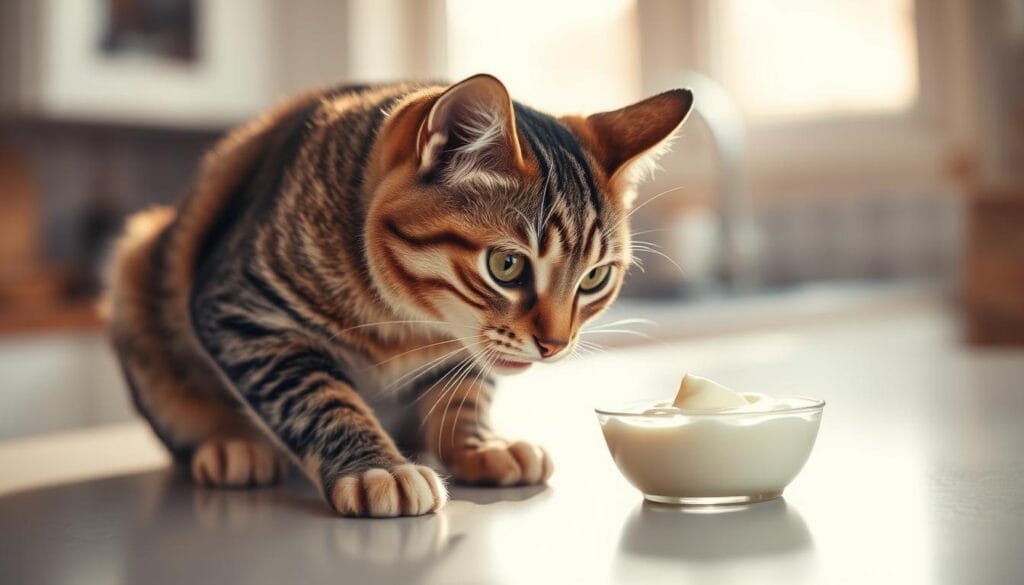
Some dairy, like goat cheese, has less lactose and might be safer for cats. But remember, even a little dairy can upset a cat’s stomach. If you’re thinking of giving your cat dairy, talk to your vet first. They can tell you if it’s okay and suggest safer options.
Can Cats Eat Cheese Safely?
As a cat owner, you might ask is cheese ok for cats to eat. Cats and cheese might seem like a good mix, but it’s important to think about the cheese type and your cat’s needs. About 70-90% of adult cats can’t digest dairy, like cheese, well.
Some cheeses, like cheddar and mozzarella, are okay for cats in small amounts. But, it’s key to not give them too much or too often to prevent stomach problems.
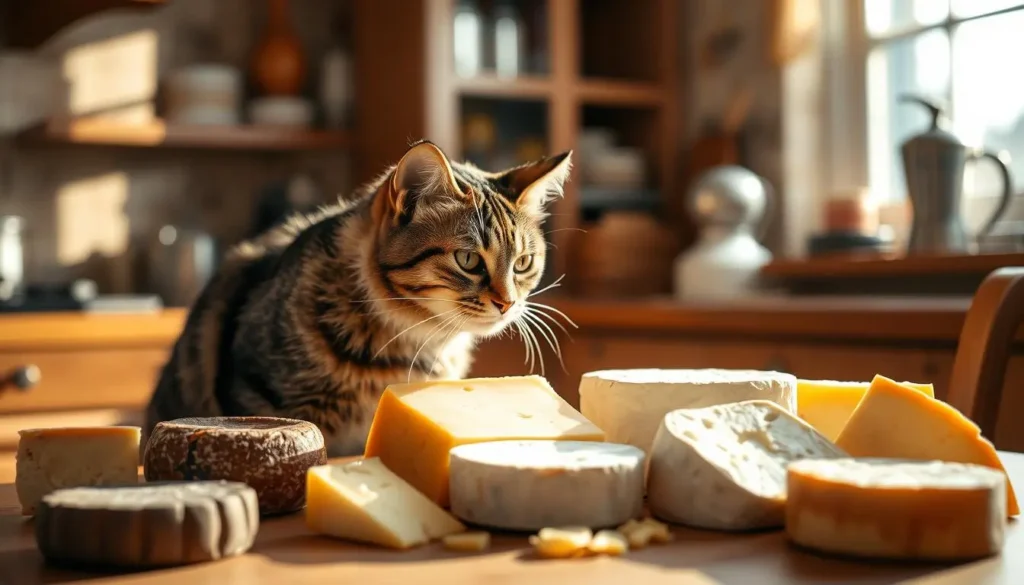
Here are some tips for giving cheese to your cat: * Give them small amounts, like a dice, and only a few times a week. * Pick cheeses with less lactose, like cottage cheese or hard cheeses like cheddar. * Stay away from soft cheeses, like cream cheese and brie, because they have more lactose. * Watch how your cat acts and feels after eating cheese. If they seem sick, talk to your vet.
While cats and cheese might taste good together, it’s vital to think about your cat’s health. Feed them cheese in small amounts and watch their needs closely.
Nutritional Value of Cheese for Cats
Thinking about can cats eat cheese or can cats have cheese? It’s key to look at cheese’s nutritional value for your cat. Cheese has protein and calcium, which are good for your cat’s health. Dr. Bayazit says, “Cheese is high in calcium and protein, and cats really love protein.”
A cat’s diet should be 52% protein, 36% fat, and 12% carbs. Cheese can help with these needs but remember the downsides. A little cheese can give a cat all the calories they need, causing obesity and health problems.
Important things to think about when looking at cheese’s nutritional value for cats include:
- High protein content, which supports muscle growth and maintenance
- Calcium content, which is key for strong bones and teeth
- Potential lactose intolerance, which can cause stomach issues
- High sodium content, which can lead to high blood pressure and dehydration
When deciding if can cats have cheese, consider the good and bad. Cheese can be a healthy treat in small amounts. But too much can cause serious health issues. Always talk to your vet about your cat’s diet. Look for other treats that are safe and meet your cat’s needs without cheese’s risks.
Common Types of Cheese and Their Safety for Cats
Wondering can cats eat string cheese or other cheeses? The answer varies by cheese type and your cat’s sensitivity. Hard, aged cheeses like cheddar or parmesan are safer for cats.
Softer, fresher cheeses have more lactose. This can upset a cat’s stomach, leading to vomiting and diarrhea if they’re intolerant. It’s key to pick cheeses low in lactose and fat to avoid digestive problems.
Here are some common cheeses and their safety for cats:
- Hard, aged cheeses like cheddar, parmesan, and Swiss are generally safer for cats.
- Soft, fresh cheeses like mozzarella, feta, and goat cheese are higher in lactose and may cause digestive issues.
- Cottage cheese is an exception, as it is typically lower in lactose and high in protein, but it should be fed in moderation.
Remember, cheese should be a rare treat, not a regular part of your cat’s diet. About 70% of cats can’t digest lactose well. Watch your cat’s behavior and adjust their diet if needed. If unsure about safe cheeses, talk to your vet for advice.
Signs of Cheese Intolerance in Cats
As a cat owner, it’s key to know the signs of cheese intolerance in your pet. Some cats can handle cheese just fine, but others might not. If you’re curious about can cats eat cottage cheese or can cats eat cream cheese, watch your cat closely after they eat these.
Cats with lactose intolerance might get diarrhea or vomit after cheese. These problems can be mild or serious, depending on the cat and how much cheese they eat. Some cheeses, like cream cheese, have more lactose, which can make things worse.
If your cat shows these signs after eating cheese, see your vet. They can tell you what to do next and suggest safe treats for your cat.
It’s wise to only give your cat a little cheese, about the size of a die. This way, you can avoid upsetting their stomach and other health problems.
How Much Cheese Can Cats Have?
Feeding cheese to your cat should be done with care. While some cats like cheese, it’s not essential for their diet. So, can cats eat cheese or can cats have cheese? Yes, but only in tiny amounts and rarely.
A small, dime-sized piece of cheese is the max for your cat. It’s a treat, not a meal substitute. Dr. Bayazit, a top feline nutrition expert, suggests using cheese sparingly. It’s best as a tiny sprinkle on their food or as an occasional reward.
How often to give cheese to your cat? Less is better. Try to give cheese no more than once or twice a week. Too much can upset their stomach or cause health problems like obesity or diabetes. Always choose high-quality, protein-rich foods over cheese or dairy.
Here’s a quick guide to keep in mind:
- Portion size: Keep it to a dime-sized piece or smaller
- Frequency: Offer cheese as an occasional treat, no more than once or twice a week
- Types of cheese: Stick to low-lactose options like cheddar, Swiss, or provolone
- Monitor your cat: Watch for any signs of discomfort or digestive issues after feeding cheese
Remember, every cat is unique. If your cat has digestive problems or is overweight, skip the cheese. Always check with your vet if you’re unsure about what’s safe for your cat.
By keeping portions small and giving cheese sparingly, you can keep your cat healthy and happy. A little treat now and then can strengthen your bond with your pet.
Best Ways to Serve Cheese to Your Cat
When thinking about is cheese ok for cats, remember that cats and cheese can be a good mix if done right. A great way to serve cheese to your cat is by sprinkling a little on their food. This can make their meals more exciting and help them eat better.
Another good idea is to use cheese as a treat. But, it’s important to pick safe cheese for cats. Some cheeses, like cottage cheese, have less lactose and can be given in small amounts. Always talk to your vet before adding new foods or treats to your cat’s diet.
Here are some tips for serving cheese to your cat:
- Choose low-fat cheese options to avoid digestive issues
- Limit the amount of cheese to 5% or less of your cat’s total diet
- Avoid giving cheese to overweight cats due to its high-fat content
Remember, cats need different foods than humans. Their diet should be made just for them. While cheese can be a tasty treat, it’s key to keep their health first.
Alternatives to Cheese for Cat Treats
Thinking about can cats eat cheese or can cats have cheese as treats? It’s key to find safer, healthier options for your cat. Cheese can be bad for cats because most can’t digest lactose well. This is true for about 70-90% of adult cats.
Start with healthy, cat-made treats. These are made with safe ingredients and meet your cat’s nutritional needs. Options like freeze-dried chicken or salmon are great. They’re full of protein and low in fat.
You can also make your own treats at home. Use cooked chicken, fish, and spinach. These are tasty and full of nutrients. Always talk to your vet before adding new foods or treats to your cat’s diet.
Here are some cheese-free alternatives:
- Cooked chicken or turkey
- Steamed fish
- Pureed pumpkin or sweet potatoes
- Green beans or carrots
These treats are not only good for your cat but also fun to make. They help you bond with your cat. Choosing these options keeps your cat happy and healthy, avoiding cheese’s risks.
Health Risks of Feeding Cheese to Cats
Cheese can be a fun treat for cats sometimes. But, it’s important to know the health risks of giving it to them often. As a pet owner, you should think about the good and bad to keep your cat healthy.
One big worry is that cheese can make cats fat. It has a lot of calories and fat. For example, just 1 ounce of cheddar cheese has over 100 calories. This can cause weight gain and lead to serious health problems like diabetes and heart disease.
Another issue is digestive problems. Many cats can’t digest lactose, a sugar in dairy like cottage cheese. This can cause diarrhea, vomiting, and belly pain. Kittens might be okay with dairy, but as they get older, they can’t digest it as well.
There are also long-term health risks. Eating too much high-fat cheese can harm the liver. It can also cause dehydration and kidney problems, which are worse for older cats or those with health issues.
If you’re thinking about giving your cat cottage cheese or cream cheese, remember to do it in small amounts. Always talk to your vet before changing your cat’s diet. This ensures your cat gets what they need for their health.
When to Avoid Giving Your Cat Cheese
As a cat owner, it’s key to think about your cat’s needs before giving them cheese. Some cats can handle cheese, but others might not do well. If you’re wondering is cheese ok for cats, it depends on your cat’s health and how they handle lactose.
Cats with health issues like kidney disease or diabetes should not have cheese. Also, cats and cheese can be bad if your cat can’t digest lactose, which is true for 70-90% of cats. In these cases, safer and healthier treats are better for your cat.
Here are some times when you should not give your cat cheese:
- If your cat has had stomach problems or digestive issues before
- If your cat is overweight or obese, as cheese is high in fat and calories
- If your cat has a sensitive stomach or is prone to food allergies
It’s important to put your cat’s health first when deciding what to feed them. If you’re not sure about cheese, talk to your vet for advice that fits your cat’s needs.
Conclusion: Making the Right Choice for Your Feline Friend
As you’ve learned, cats can eat cheese, but with caution and moderation. Cheese can offer some nutritional benefits. Yet, it’s key to think about your cat’s needs and the risks of too much cheese.
Most adult cats are lactose intolerant. This means they have trouble digesting dairy’s lactose, leading to stomach issues. It’s vital to give cheese in small amounts and watch how your cat reacts.
Cheese is also very calorie-dense. Eating it too often can lead to weight gain and obesity. Obesity in cats can cause diabetes, joint problems, and shorten their life.
Before giving your cat cheese as a treat, talk to your vet. They can give advice tailored to your cat’s age, breed, and health. With careful planning, cheese can be a safe and fun treat for your cat.
FAQ
Can cats eat cheese?
Cats might like cheese, and it can be a low-carb snack in small amounts. But, it’s important to only give a little bit. Too much cheese can be too fatty and salty. It also has lactose, which some cats can’t handle.
Is cheese safe for cats?
Whether cheese is safe for cats depends on the type and how much you give them. Hard, aged cheeses are usually safer than soft, fresh ones. Watch how your cat reacts and don’t give cheese if they have digestive problems.
What are the benefits of feeding cheese to cats?
Cheese can be a good treat for cats because it’s low in carbs and high in protein. It also has calcium and protein. But, remember, too much cheese can be bad, so give it in small amounts.
What types of cheese are safe for cats?
Hard cheeses like cheddar, parmesan, and swiss are safer for cats. Avoid soft cheeses like cottage cheese or cream cheese because they have more lactose. Don’t give your cat too much cheese.
How much cheese can cats have?
Cats should only get a little cheese as a treat. A small amount on their food or an occasional tiny bite is okay. But, too much can cause stomach problems and weight gain.
What are the signs of cheese intolerance in cats?
Signs of cheese intolerance in cats include vomiting, diarrhea, bloating, and stomach pain. If your cat shows these signs after eating cheese, stop giving it to them and talk to your vet.
What are some alternatives to cheese for cat treats?
There are many healthy treats for cats that don’t upset their stomachs. Try freeze-dried meat, seafood, or veggie-based treats. It’s better to avoid dairy-based treats for your cat.

